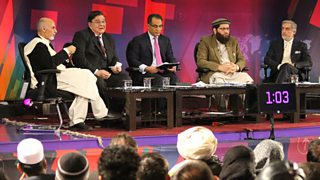Afghan elections: a battle between fear and hope
Shirazuddin Siddiqi
Country Director, Afghanistan
Tagged with:
Since the departure of the Taliban regime in late 2001, experts on Afghanistan have been saying every year has been a critical year for the country. Often for very good reasons. But the significance of 2014 can hardly be exaggerated. Partly it’s because this year will see the end of international assistance in key areas. But mainly because it will bear witness to what will hopefully be the first ever peaceful democratic transfer of power in Afghanistan's history.Β
Afghanistan's war-weary people are, therefore, caught between fear and hope – feelings which have been clear to see in a special series of our TV and radio debate show Open Jirga dedicated to the elections.Β

The seven shows brought people from all 34 provinces of Afghanistan face to face with politicians, election commissioners and presidential candidates to debate the issues.
In feedback after the show, one audience member told us, "It was a completely new way of approaching officials. We have never experienced such a chance to see and meet presidential candidates and tell them our problems in the provinces."
Seventy eight per cent of those who responded to our questions after taking part also said they were positive that the show would make leaders more accountable to the people.
Key issues
Unsurprisingly, one of the biggest issues brought up by the audience was security. , Sharifa Ahmadzai from Helmand, for instance, asked: "There are a lot of insecure areas in our provinces. Would this insecurity not lead to fraud [in the elections]?"
Mohammad Sarwar from Ghor asked about plans to "secure the roads between provincial centres and the surrounding districts" which, he said, "have been insecure for the last 10, 11 years".
In response, presidential hopeful Ashraf Ghani Ahmadzai said his first step would be to ask the armed forces to report every eight hours on the security situation to the President, and create a "reward and punishment" mechanism for people responsible for specific roads who would take "assertive action against criminality".
Another contender, Abdullah Abdullah responded that "attracting public cooperation was the main issue" and that he would strengthen the intelligence and judicial systems and police's ability to respond rapidly to ensure road security.
Worry about electoral fraud was articulated by the audience in every programme.
For instance, one audience member from the central highlands said "in many areas people stop women, in the name of tradition, from going to polling stations and they themselves use their cards to vote for their preferred candidates".
Other major issues were the track record of candidates or their running mates – particularly when it came to their role in the 1990s civil war and human rights violations – and the future role of Sharia law in the country.
Women's role in the elections was also put under the spotlight in one special show, which saw a lively debate about the absence of a female presidential candidate and what stops women voting, including the remoteness of polling stations as well as religious and cultural barriers. (For more on this show, read a blog from the .)
Turning point
There is, no doubt, a sense of weariness about these elections among the Afghan public. But what also became clear from these shows is the public’s passion - and their understanding of what’s at stake.
Two speakers in particular stand in my mind.
The first was a young woman called , who responded with fury when presidential contender Ahmad Shah Ahmadzai commented that he thought voting had before only led to international forces in Afghanistan, a presence he vehemently opposed.
"You encourage me not to vote. Why?" Mariam replied angrily, before defending the hard-won progress in Afghanistan over the last decade.
"In the last 12 years I have studied and graduated from the university. I am happy with Karzai because he brought peace. I have not forgotten 12 years ago when the Taliban were [in power]. Despite wearing the full veil, we used to get whipped in the head. [Please] remember those years... and keep your voting card as safe as your degree [document]."
Her words were met by thunderous applause from the studio audience.
The second memorable speaker was another eloquent, impassioned woman, Marzia from Paktia province.
"I say this as an Afghan and as a mother. We have endured a lot of pain," she said. "We should encourage our people to vote so we can [elect] one person, and then put pressure on them [to deliver]. And if they can’t do [the job] or fails to fulfil his promises, we can then all rise!"
Related links
Follow Βι¶ΉΤΌΕΔ Media Action on and
